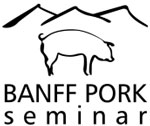



‘Activist Thinking’ is Key as Pork Industry Tackles Global Challenges
The pork industry needs to think both as a leader and an activist at a global level in order to drive economic prosperity while helping the world battle poverty and feed a population set to hit nine billion by 2050, said speakers at the 2012 Banff Pork Seminar. The Seminar launched its 41st event with an ambitious focus on ‘Feeding Tomorrow’s World’.
The industry, particularly in North America, is slowly emerging from an extremely challenging and volatile four-year period and is now taking steps toward improved stability, profitability and renewed optimism.
As the industry steadily gains traction it has the opportunity to take a fresh look at its big-picture role in the world, observed Jim Haggins, Chairman of the Banff Pork Seminar, in his opening remarks.
In addition to capturing new opportunities to strengthen the industry, such as latching on to China's rising market and harnessing the power of new technology advances, this role also spans the pressing global challenges of battling poverty and driving new progress for safe, affordable and abundant food.



"Our economic success is intertwined with these challenges," said Mr Haggins. "As our industry continues to make progress through many changes, the global situation causes us to reflect and make adjustments. We know we have a critical role in the world. We also know that our prosperity as an industry hinges on global growth in food and feed demand from sources that can afford to pay for it."
World population is over seven billion and projected to reach over nine billion by 2050. Livestock production needs to double to supply food demand. Approximately 10 per cent of the world's landmass is arable today and not expected to grow. And the world is currently using about 70 per cent of its fresh water supply. Food is a major issue for more than half the world's population that either cannot afford or access an adequate, quality nutritional diet.
Livestock farming is a powerful intervention tool, says Dr Gregg BeVier of the Bill and Melinda Gates Foundation, which is dedicated to bringing innovations in health, development and learning to the global community. The Foundation heavily researches issues and seeks areas where it can uniquely contribute with targeted investments for the greatest impact.
"The poverty hot spots of the world are by far in rural areas where agriculture is the main form of sustenance and income," said Dr BeVier. "Livestock is a ladder for improving the lives of farmers and communities in these areas. Interventions to improve animal health, genetics, nutrition and other fundamentals can help create a pathway out of poverty."
The challenge is summed up by three numbers – 50, 100, 70, said Jeff Simmons, President, Elanco Animal Health. "In the year 2050, the world will require 100 per cent more food and 70 per cent of this food must come from efficiency-improving technology."
It is absolutely critical for the world to remove barriers to these technologies and for livestock industries to be active, outspoken leaders in addressing what is unquestionably the world's biggest issue at a crucial time in history, he said.
"This is not a time to let up. This is a time to innovate and a time to also stand up for the technologies we currently have. While we have an economic opportunity, we also have as much of a moral responsibility. We need to be more activist-like in our thinking and engage in the debates that are out there in all corners."
A silver lining of the global recession is that it has brought more logic to the global food system, added Mr Simmons. "It makes it easier to see what's important. People the world over want and need the same thing – safe, abundant and affordable food."
Further Reading
| - | You can other articles from the Banff Pork Seminar 2012 by clicking here. |
February 2012








